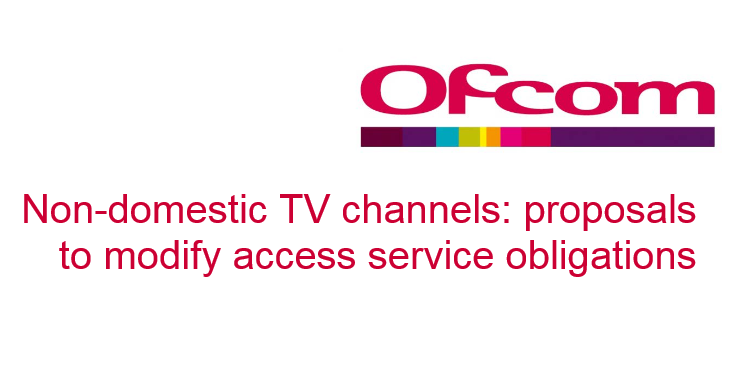Search
News categories
Ofcom’s proposals on signing arrangements for non-domestic TV channels
Ofcom’s proposals on signing arrangements for non-domestic TV channels
 On 14 October 2015, Ofcom has published proposals on signing arrangements for non-domestic TV channels – i.e. channels licensed by Ofcom for transmission to other Member States of the EEA. The regulator currently imposes access services obligations on about 40 non-domestic channels.
On 14 October 2015, Ofcom has published proposals on signing arrangements for non-domestic TV channels – i.e. channels licensed by Ofcom for transmission to other Member States of the EEA. The regulator currently imposes access services obligations on about 40 non-domestic channels.
The objective of these proposals is to enable sign language users to understand and enjoy TV, using the type of assistance that best suits them, whether this is subtitling, sign-interpretation or sign-presentation. The amount of assistance would increase over time from 1 January 2017 but would be different, depending on the type - subtitling, sign-interpretation or sign-presentation. These proposals are consistent with the arrangements for domestic channels that have been decided in May 2015.
As with domestic channels, the requirement that would be applied by default to TV channels with smaller audiences (in practice, all the non-domestic channels that currently qualify) would be to show sign-presented programmes, i.e. programmes specially made for deaf people and presented by someone who uses sign language.
However, if Ofcom is satisfied that sign-language users would prefer a different form of assistance (subtitling or sign-interpretation, i.e. with a sign language interpreter in the corner of the screen), broadcasters could be required to provide this.
Whichever form of assistance would finally be required, Ofcom proposes that broadcasters should be allowed to suggest different ways of delivering this objective. If Ofcom was satisfied that these alternative arrangements would be better for sign language users and would meet Ofcom's criteria, it could accept them. This is similar to what happens with qualifying channels in the UK where broadcasters proposed the alternative of paying for the British Sign Language Broadcasting Trust (BSLBT) to make sign-presented programmes that are shown on TV.
Although the objective is simple, the mechanisms are more complex, as they must take account of the legal framework and the need for consistency with the arrangements for domestic channels. Furthermore, Ofcom expects that broadcasters would need time to prepare for the signing requirements that would follow this consultation. For this reason, Ofcom proposes that all non-domestic channels with smaller audiences should be allowed to provide subtitling on 5% of their programmes instead of signing until the end of 2016.
Finally, further to the transposition of the AVMS Directive in Iceland, Liechtenstein and Norway, access service obligations now apply to channels broadcast in these countries and access services obligations should begin from 1 January 2017.
Source: Ofcom
Attached Documents
Tags
Countries
See also
- Ofcom revises signing arrangements for low audience channels posted on 19 May, 2015 02:00
- Television Access Services: Ofcom's final report for 2015 posted on 08 April, 2016 02:00